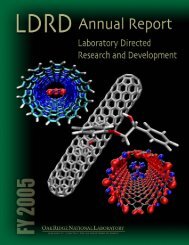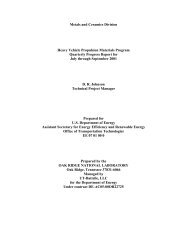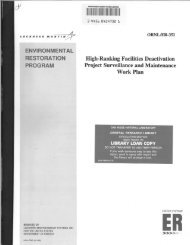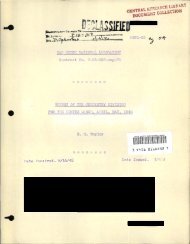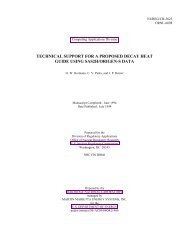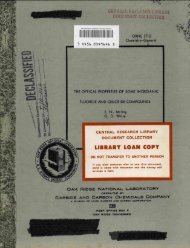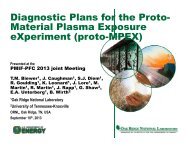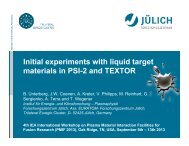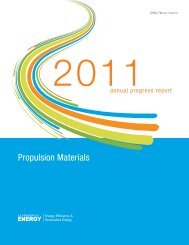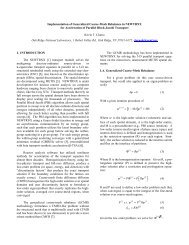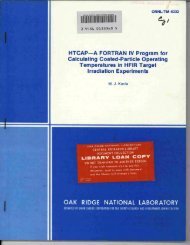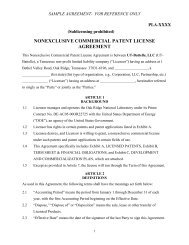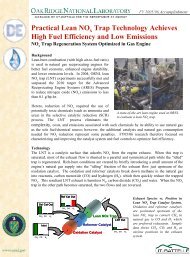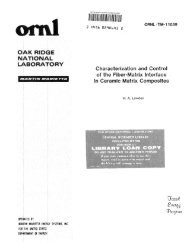FY2010 - Oak Ridge National Laboratory
FY2010 - Oak Ridge National Laboratory
FY2010 - Oak Ridge National Laboratory
Create successful ePaper yourself
Turn your PDF publications into a flip-book with our unique Google optimized e-Paper software.
Director’s R&D Fund—<br />
Ultrascale Computing and Data Science<br />
for reactor simulation applications; (3) demonstrating fidelity for several target nuclear energy benchmark<br />
simulations; (4) developing a novel space-energy domain decomposition algorithm for eigenvalue<br />
transport problems; and (5) demonstrating the use of Denovo in multiscale nuclear energy applications,<br />
including both fuels and reactors, with resolved materials. The CASL project has provided follow-on<br />
funding that will enable the tight-coupling of Denovo with many other physics packages, and the<br />
distribution of Denovo to a broad spectrum of expert reactor analysts in the commercial nuclear industry<br />
to provide a far-reaching impact for the nuclear energy community. In terms of quantifiable milestone<br />
accomplishments, Denovo has<br />
<br />
<br />
<br />
met the 2010 DOE Joule program milestone for demonstrated scalability on Jaguar;<br />
met the OLCF-3 requirements as a Tier 1 application for the next-generation HPC hardware bid; and<br />
been part of a winning the INCITE proposal, Uncertainty Quantification for Three-Dimensional<br />
Reactor Assembly Simulations, with a successful renewal spanning 2010–2011 for over<br />
26 million CPU-hours.<br />
Additionally, Denovo-related work has contributed to two PhD dissertations, currently in candidacy, by<br />
Rachel Slaybaugh, University of Wisconsin, and Steven Hamilton, Emory University.<br />
Information Shared<br />
Evans, T. M., K. T. Clarno, and J. E. Morel. 2010. “A transport acceleration scheme for multigroup<br />
discrete ordinates with upscattering.” Nucl. Sci. Eng. 165, 292–301.<br />
Evans, T. M., A. Stafford, and K. T. Clarno. 2010. “Denovo—A new three-dimensional parallel discrete<br />
ordinates code in SCALE.” Nucl. Technol. 171, 171–200 (2010).<br />
05384<br />
Scalable, Fully Implicit Algorithms for First-Principles Kinetic<br />
Simulations at the Ultrascale<br />
Luis Chacón , Diego del-Castillo-Negrete, Raúl Sánchez , and Daniel C. Barnes<br />
Project Description<br />
This project aims at developing a novel, scalable kinetic algorithmic strategy based on fully implicit<br />
nonlinear methods. The approach will be able to exploit ORNL's ultrascale computing capabilities to<br />
enable a first-of-a-kind future predictive thermonuclear plasma modeling capability. Plasmas in the<br />
regimes of interest for nuclear fusion feature extremely disparate time and length scales. Current firstprinciples<br />
kinetic algorithms are explicit, needing to resolve the fastest time scales and the smallest length<br />
scales in the model for numerical stability, and are therefore extremely inefficient. The fully implicit<br />
character of our approach will eliminate numerical stability constraints (thus enhancing efficiency<br />
possibly by orders of magnitude). Its nonlinear character will deliver enhanced accuracy and nonlinear<br />
stability. Our approach will be particle based and thus naturally suitable for parallel supercomputers. If<br />
successful, this research will enable simulations that are presently unattainable with current algorithms<br />
even with ultrascale computing and will have direct implications for first-tier DOE projects such as ITER.<br />
Mission Relevance<br />
The project has strong relevance to two DOE missions: energy security and scientific discovery and<br />
innovation. Relevance to energy security stems from this project’s connection to magnetic fusion energy<br />
83



